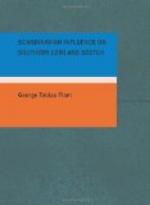ALTHING, as a sb. everything. Gau, 8,
30, corresponding to Dan.
alting. “Over
al thing,” Dan. over alting. Not
to be taken
as a regular Sco. word, however.
Gau has a number of other
expressions which correspond
closely to those of the Dan.
original of Kristjern Pedersen,
of which Gau’s work is a
translation.
ANGER, sb. grief, misery. Bruce, I, 235.
Sco. Pro. 29. O.N.
angr, grief, sorrow.
See Bradley’s Stratmann, and Kluge and
Lutz. The root ang
is general Gmc., cp. O.E. angmod,
“vexed in mind.”
M.L.G. anxt, Germ. angst, Dan. anger.
The form of the word in Eng.,
however, is Scand.
ANGRYLY, adv. painfully. Wyntoun, VI,
7, 30. Deriv., cp. Cu.
angry, painful, O.N.
angrligr, M.E. angerliche. The
O. Dan. vb. angre,
meant “to pain,” e.g., thet angar
mek,
at thu skal omod thorn stride
(Kalkar).
APERT, adj. bold. Bruce, XX, 14. apertly,
boldly, XIV, 77.
Evidently from O.N. apr,
sharp, cp. en aprasta hrieth,
“sharp fighting,”
cited in Cl. and V. Cl. and V. compares
N.Ic. napr, “snappish,”
cp. furthermore apirsmert, adj.
(Douglas, II, 37, 18), meaning
“crabbed,” the second element
of which is probably Eng.
Apr in O.N. as applied to persons
means “harsh, severe”
(Haldorson).
ASSIL-TOOTH, sb. molar tooth. Douglas, I, 2, 12. See Wall.
AT, conj. that. O.N. at, Norse,
Dan. at, to be regarded as a
Scand. word. Might in
some places be due to Celtic influence,
but its early presence, and
general distribution in Scand.
settlements in England, Scotland,
Shetland, etc., indicates
that it is Scand.
AWEBAND, sb. “a band used for tying cattle
to the stake.”
Jamieson, Lothian. O.N.
ha-band, “vinculum nervos poplitis
adstringens” (Haldorson).
Norse habbenda, “to tie cattle
with a rope between the knees
to keep them from running away.”
Cp. O. Sw. haband,
Sw. dial. haband, “a rope that unites
the oar with the oarlock.”
AWKWART, prep. athwart, across. Wallace,
III, 175; II, 109. Same
as the Eng. adj. “awkward”
which was originally an adv.
Etymologically it is the O.N.
afugr (O. Ic. oefugr) + Eng.
ward (Skeat), cp. the
Norse vb. afvige, to turn off.
I have not found the prepositional
use of the word in Eng. Cp.
“toward.”
AWSOME, adj. terrible, deriv. from awe
(O.N. agi). The ending
some is Eng. O.N.
agasamr, Norse aggsam, means
“turbulent, restless.”
AYND ([-e]nd), sb. O.N. andi, breath,
O. Sw. ande, Norse
ande, Dan. aande.




